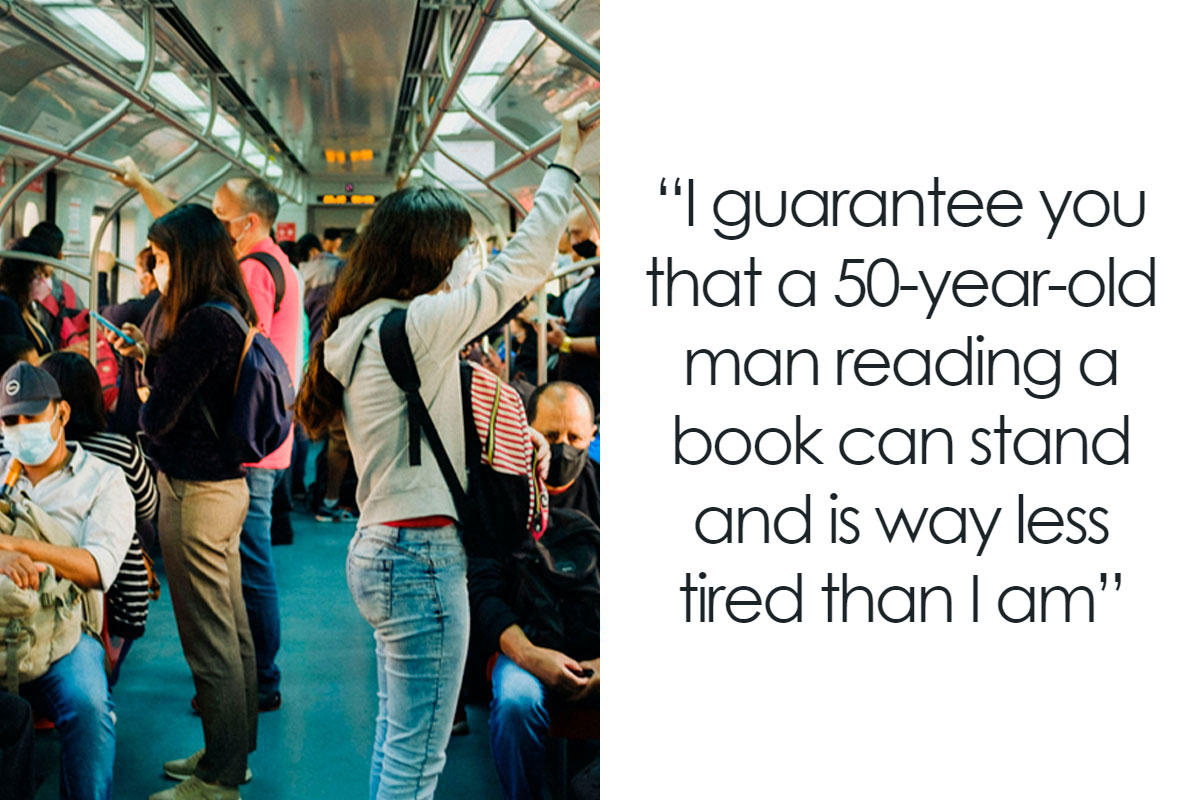
Person Refuses To Give Up Seats For The Pregnant And Elderly, Starts A Fierce Debate
Interview With ExpertWhether or not we should give our seats up for someone else when we’re tired is a practical ethical dilemma. It’s a question that many of us will have to face over and over again if we travel and use public transport frequently. And it can test how kind we are.
Reddit user u/TheAireon sparked a fierce discussion on the r/unpopularopinion online community after sharing their own unpopular opinion. From their perspective, they should be free to say ‘no’ to giving up their train seat when they’re exhausted. The internet had some very strong opinions, both in support and against this position. Read on for the discussion, and let us know what side you stand on, dear Pandas.
Bored Panda wanted to learn more about being kind to strangers, so we reached out to Dr. Harry D. Cohen, the author of the book ‘Be the Sun, Not the Salt.’ He was kind enough to share his thoughts with us, including the importance of doing small acts of kindness and leading by example. You’ll find the insights he shared with us below.
How someone responds when asked to give up their seat on public transport can reveal a lot about their values and priorities
Image credits: Dennis Siqueira (not the actual photo)
One person suggested that they shouldn’t have to give up their seat when they’re feeling incredibly exhausted
Image credits: TheAireon
Image credits: Mitchell Johnson (not the actual photo)
We should all strive to look for opportunities to do small acts of kindness as often as we can
Psychologist, executive coach, and the author of ‘Be the Sun, Not the Salt,’ Dr. Cohen, explained to Bored Panda that when it comes to kindness, it is vital to lead and influence others by example. It is through consistent action, not words, that kindness spreads.
He told us in a phone interview that we should all be mindful of the small ways that we can be kind and help the people around us. This can be something small like smiling at someone, holding the door open for them, or helping them with their baggage.
According to Dr. Cohen, there’s an infinite number of ways to be compassionate. We should be proactive and look for opportunities everywhere for how we can assist others. You can simply go up to someone who seems to be having some trouble and ask them if you can help.
Equally as important is that we refrain from doing and saying unkind things. Through consistent daily practice, we can all unlearn habits of unkindness if we have any.
But the essential thing is not to focus on what someone else should or should not do. We ought to worry about ourselves and apply what we know about kindness and altruism in practice. That’s difficult to do from moment to moment.
He noted that these acts of kindness do not necessarily have to be large. We can start very small.
However, it’s far more difficult to be kind when we’re feeling exhausted. Bored Panda asked Dr. Cohen about this and how someone can approach these sorts of situations.
According to him, it’s vital that we prioritize our self-care. That way, we won’t be as tired, and we’ll be less prone to saying and doing things that we might regret. Dr. Cohen likened being exhausted to walking on ice. He noted that we should move slowly and carefully.
He told Bored Panda that it’s best to say and do nothing when we’re exhausted so that we don’t end up regretting it later. For some more stellar life advice and great insights, feel free to take a look at Dr. Cohen’s book, ‘Be the Sun, Not the Salt,’ as well as his blog on Psychology Today.
Image credits: Pau Casals (not the actual photo)
Different people can have very different values and principles in life
The core of this dilemma covered in the viral Reddit thread lies in comparing our situation with that of others using public transport. There are two dimensions here. First of all, we all have to ask ourselves whether our need for a seat is greater than that of other people around us.
And, secondly, we have to consider whether we have a moral duty to give up our seat regardless of how we feel. Though, on the surface, it’s a very simple moral dilemma, it’s an important one because it’s very practical. It deals with everyday issues, not just some pie-in-the-sky and ivory tower philosophical theories.
It’s very common for someone to ask us for our seats. What’s more, many of us are constantly in situations where we could get up and give up our seat for someone who we can see might need it, even though they haven’t asked us for it yet.
How we answer these questions says a lot about us and our values. Someone who constantly measures and compares their own needs versus those of others is someone who has a utilitarian approach. They want to maximize the happiness of the crowd. So they weigh their exhaustion against that of their fellow travelers as best as they can.
In the meantime, someone who would give up their seat when asked to, no matter how they’re feeling at the moment, might be considered a deontologist. They have a duty and obligation-based way of seeing the world. They will strive to live according to their principles, no matter the situation. Especially when things get hard.
Image credits: Krists Luhaers (not the actual photo)
It’s vital to be able to recognize if someone on public transport may need assistance
On the flip side, somebody who refuses to give up their seat no matter what probably has a very individualistic way of viewing the world. They see their needs as a priority, no matter what’s going on around them. So, they’ll only ever give up their seat if doing so would be advantageous. It’s these people that others might view as being overly selfish.
Alternatively, the person might be an egalitarian who sees everyone as being fundamentally equal. However, how someone understands this approach can vary. Some might decide that nobody deserves special treatment because, well, everyone’s equal. Others might decide to give up their seat to the neediest to fight back against the unfairness of the world.
Most of us have probably happily given up our seats to someone who is elderly, pregnant, or has a disability. However, not all disabilities are visible. On top of that, not everyone notices that someone may need a seat because they’re busy or distracted during the commute.
That’s why it’s so important for people to communicate their needs. If they require a seat, if they’re utterly exhausted, if they’re feeling unwell—they should speak up and ask for it. At the same time, we could all stand to cultivate more awareness of our surroundings and look for opportunities to help others.
However, if you also genuinely need the seat and can barely stand, you should do your best to be as polite as possible if you refuse to get up. Being kind goes a long way, even if you ultimately want to say ‘no.’
What do you do when someone asks for your seat on public transport, Pandas? Do you always get up? Have you ever refused to give up your seats? If so, why? Share your thoughts in the comments!
Image credits: Snapwire (not the actual photo)
A few internet users had similar stories to the author’s that they wanted to share
Some readers stated that it’s perfectly fine to say ‘no’ to your fellow passengers
Others, however, felt differently. Here’s their take on the situation

Poll Question
Thanks! Check out the results:
There have been times when I have been asked to move out of the section reserved for the elderly and disabled. However, I was sitting in the right place. I would loudly address the bus, and ask, "Would someone be willing to give up their seat for this passenger? I'm afraid I can't as I have X disability." On the four occasions I've done this a couple of people have offered to stand. I don't want to put my safety at risk, but I also don't want to the safety of others at risk too.
The only logical thing to do. I do not see the problem. I also stand up if I feel well and see someone in need even if I am not sitting on a special reserved seat. I think it is common courtesy. (And there I go with Kant to behave like I want others to behave. )
Load More Replies...Some one nailed it with the public judgement comment. What they missed was that negatively judging (or even commenting on) a healthy-looking person for not giving up their seat is rooted in assumption & ignorance. I saw this happen on Muni (San Francisco subway/train) to a very muscular young jock-type guy. I was already standing near a few people who murmured how rude & inconsiderate he was. There were some tsks & harsh glares. He yanked open his shirt & raised his undershirt to reveal a PICC line (IV port) with an attached tube. I noticed when the quiet guy across from him exclaimed “Jesus Christ!” The glares & disapprovals stopped, but not an apology uttered. Clearly the dude was going thru something & needed to sit bad enough to take the public disapproval & chastising. The question is why those who negatively reacted assumed he was a selfish a*****e rather than someone who really needed his seat even if they couldn’t deduce why. It speaks more about their character than his.
As a disabled person, I have never encountered this on Muni, but boy, will you get ignored on BART! I have stood right in front of commuters with my cane, needing a seat, ASKING for a seat. Suddenly, everyone in that section of the car turns into Helen Keller, all the while with their heads bent over their electronic toys. One of the main reasons why I no longer ride public transportation.
Load More Replies...You don't HAVE to offer your seat, ever. There are usually seats reserved for people with disabilities, elderly etc, there they have priority, the rest is fair game. That said, it is a nice gesture and common courtesy to do so, but it's up to you and you don't have to justify not doing so.
There have been times when I have been asked to move out of the section reserved for the elderly and disabled. However, I was sitting in the right place. I would loudly address the bus, and ask, "Would someone be willing to give up their seat for this passenger? I'm afraid I can't as I have X disability." On the four occasions I've done this a couple of people have offered to stand. I don't want to put my safety at risk, but I also don't want to the safety of others at risk too.
The only logical thing to do. I do not see the problem. I also stand up if I feel well and see someone in need even if I am not sitting on a special reserved seat. I think it is common courtesy. (And there I go with Kant to behave like I want others to behave. )
Load More Replies...Some one nailed it with the public judgement comment. What they missed was that negatively judging (or even commenting on) a healthy-looking person for not giving up their seat is rooted in assumption & ignorance. I saw this happen on Muni (San Francisco subway/train) to a very muscular young jock-type guy. I was already standing near a few people who murmured how rude & inconsiderate he was. There were some tsks & harsh glares. He yanked open his shirt & raised his undershirt to reveal a PICC line (IV port) with an attached tube. I noticed when the quiet guy across from him exclaimed “Jesus Christ!” The glares & disapprovals stopped, but not an apology uttered. Clearly the dude was going thru something & needed to sit bad enough to take the public disapproval & chastising. The question is why those who negatively reacted assumed he was a selfish a*****e rather than someone who really needed his seat even if they couldn’t deduce why. It speaks more about their character than his.
As a disabled person, I have never encountered this on Muni, but boy, will you get ignored on BART! I have stood right in front of commuters with my cane, needing a seat, ASKING for a seat. Suddenly, everyone in that section of the car turns into Helen Keller, all the while with their heads bent over their electronic toys. One of the main reasons why I no longer ride public transportation.
Load More Replies...You don't HAVE to offer your seat, ever. There are usually seats reserved for people with disabilities, elderly etc, there they have priority, the rest is fair game. That said, it is a nice gesture and common courtesy to do so, but it's up to you and you don't have to justify not doing so.
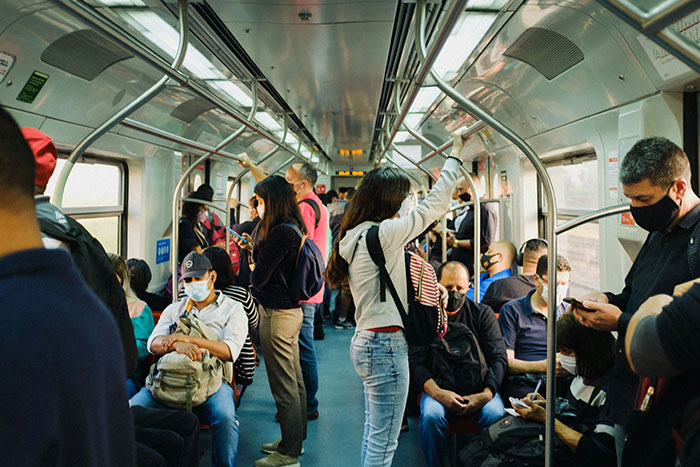
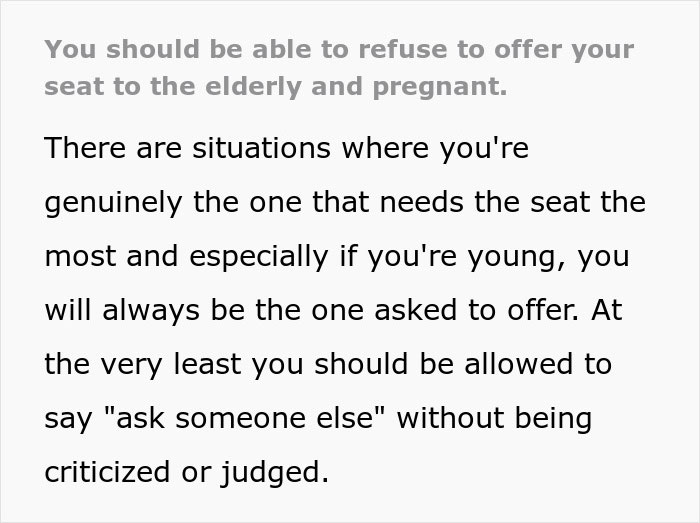
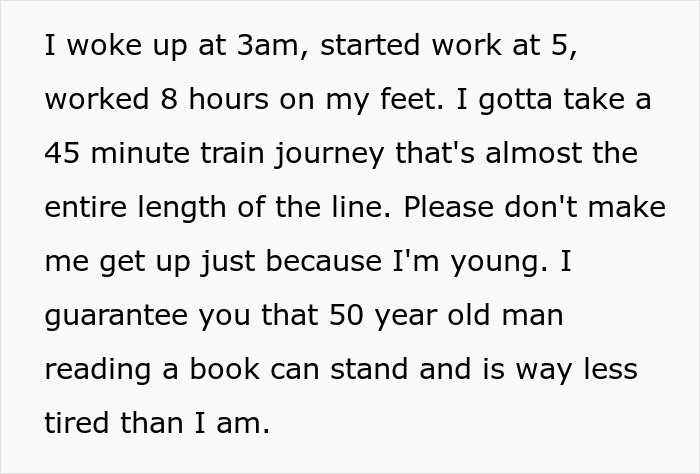

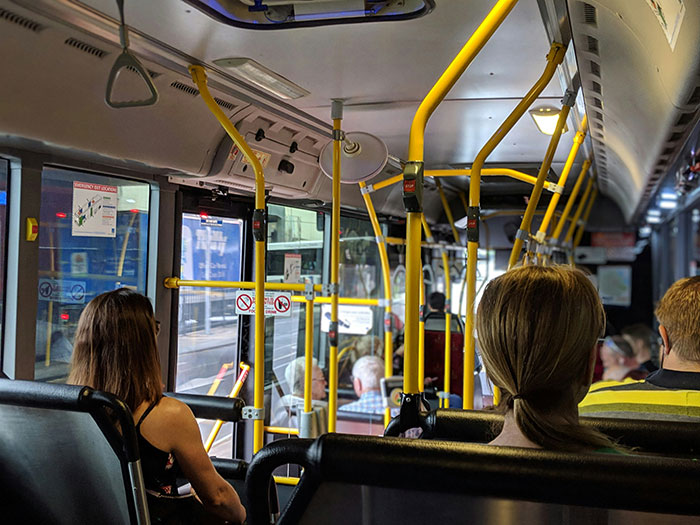
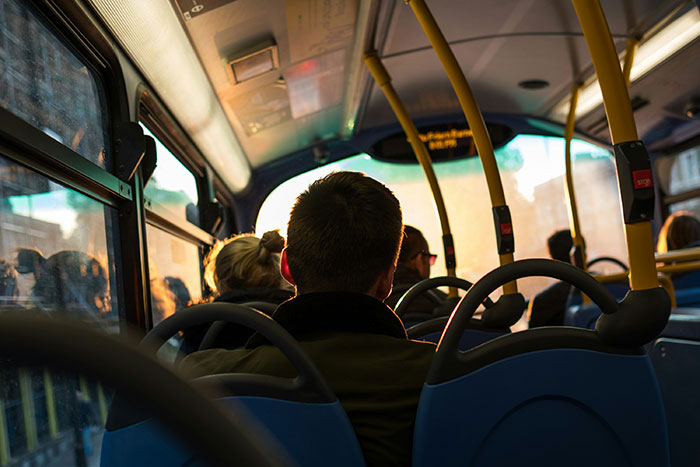
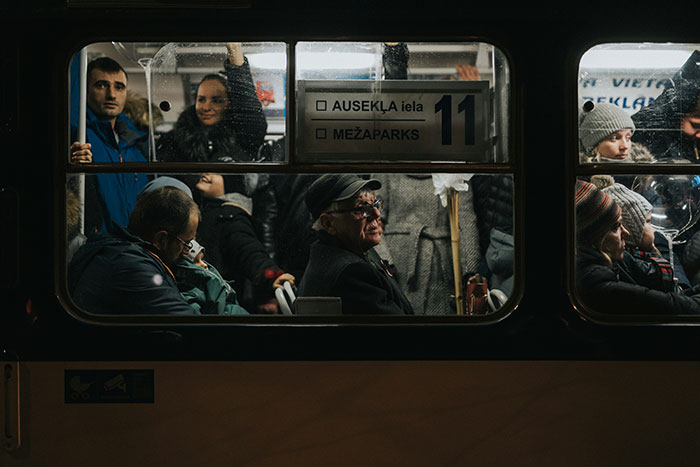
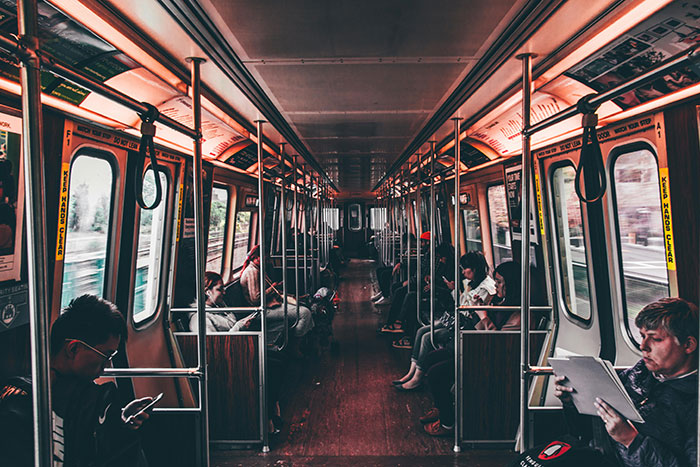


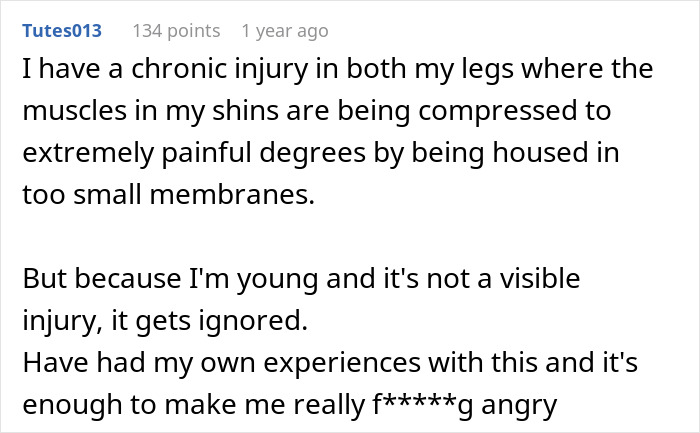
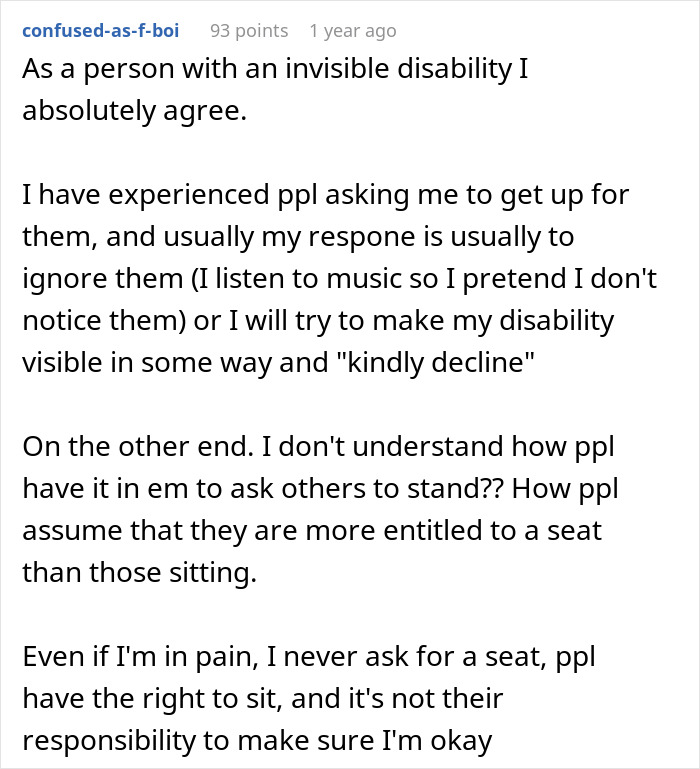
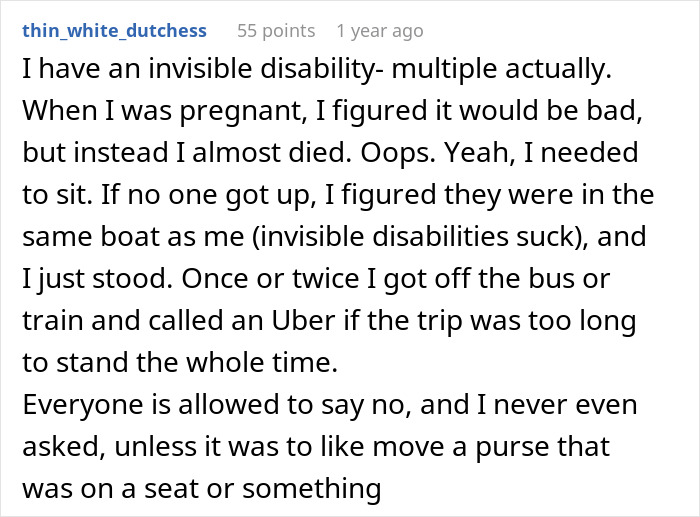
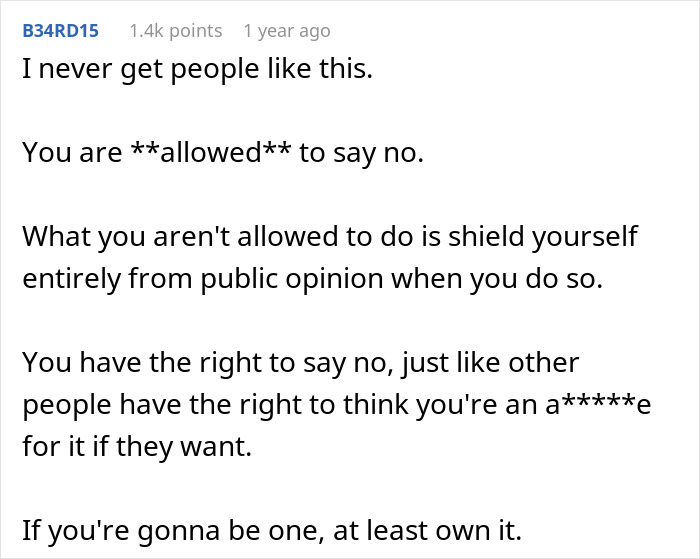

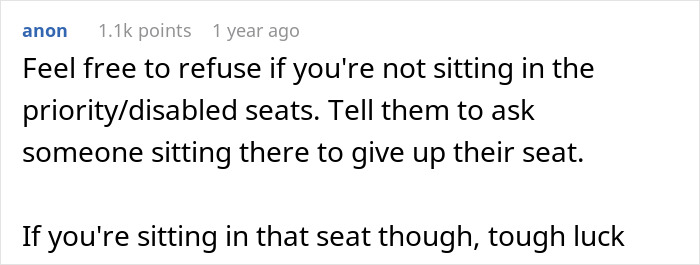

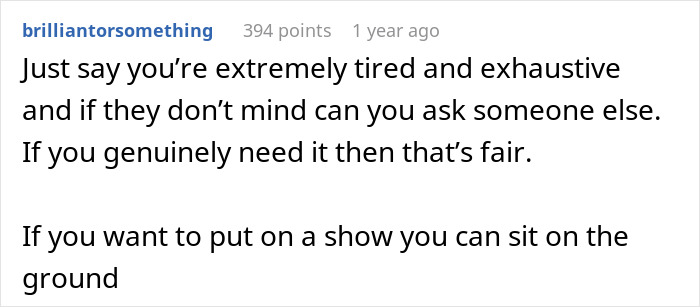



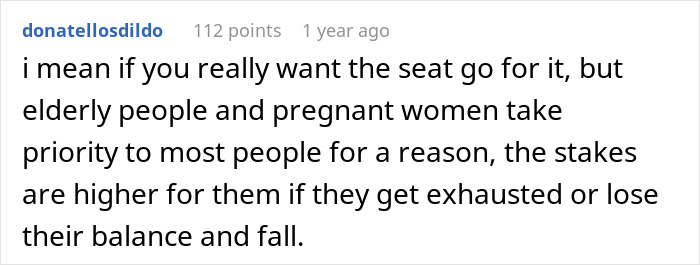


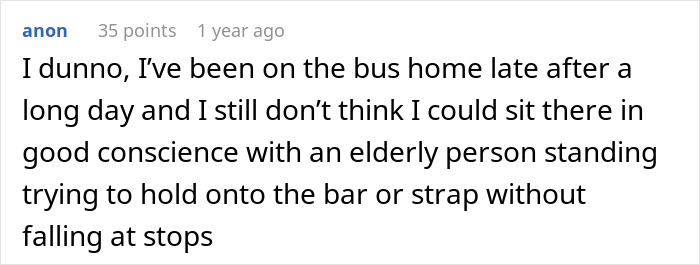

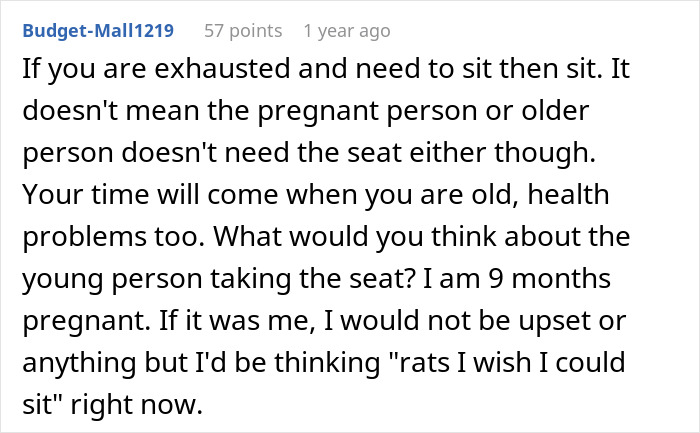

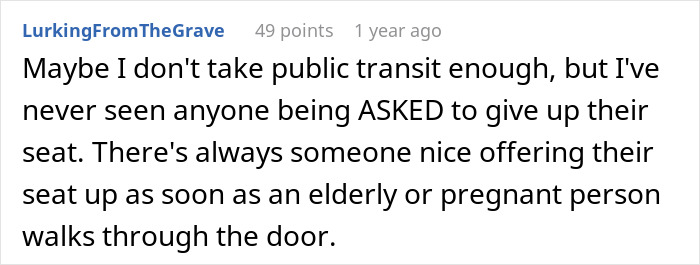
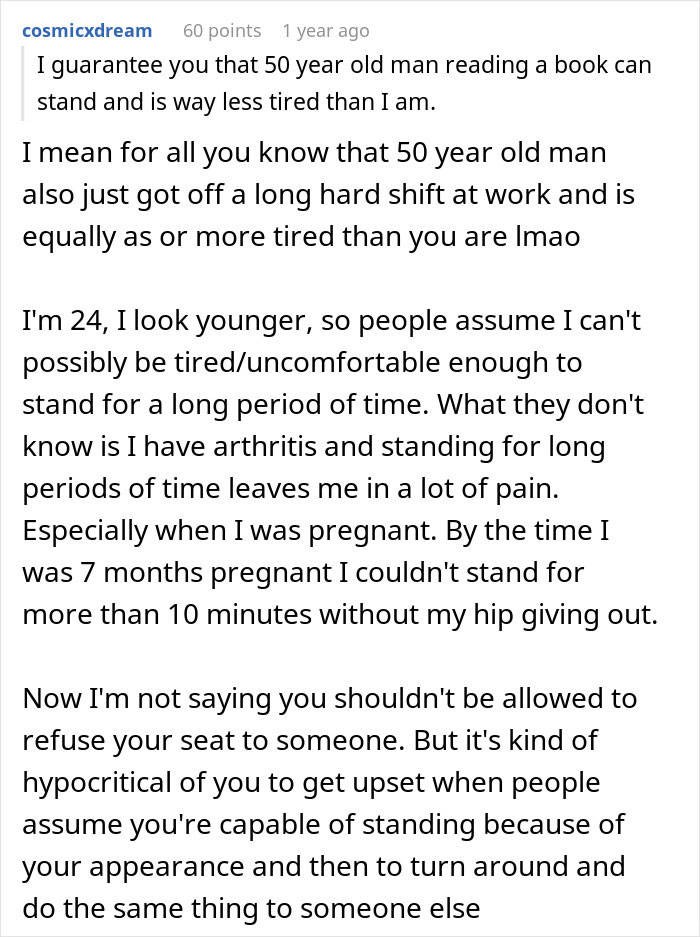
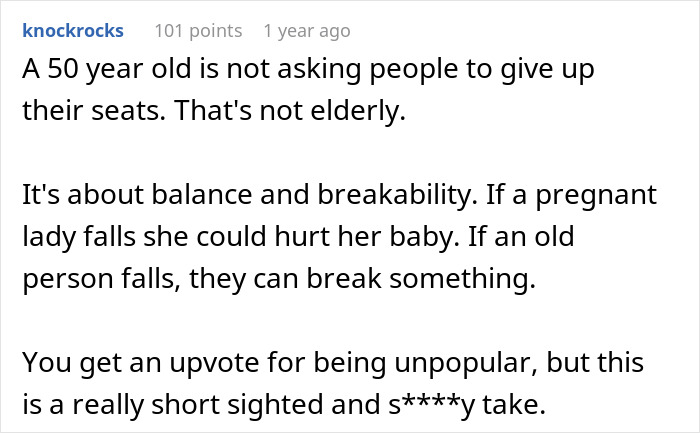






19
59